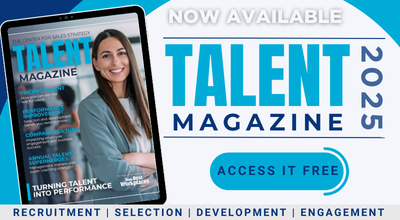
Recruiting top talent is tough… and it’s getting more challenging every day!
Want to know how to up your game?
Create a top-notch candidate experience.
Do a pretty good job here, and your candidates will feel good about your company when they walk away. Do a great job here, and they feel good enough about your company to share their positive feelings with others which builds your company’s reputation and boosts your employer brand.
Whatever you do, don’t get this wrong! A bad candidate experience also leads to sharing, but not in the way that you want. One in five will actively advise both job candidates and customers to keep away too. (CareerBuilder)
Top 10 Tips on Nailing the Candidate Experience
1. Set the Stage Well
The best way to get off on the right foot is to craft a job description that seems to magnetically attract those who are right for the role and simultaneously repel those who aren’t.
A great job description paints a picture of what the job really is and what success will look like. Once you identify the strengths you need for the role, describe them, using honest language like, “this salesperson will need to enjoy the hunt, overcome rejection quickly, and recognize that at the end of a tough day, tomorrow will be better.”
The more honest the job description, the less time you will waste down the road. Also, provide the full name of the direct manager and a transparent timeline for your hiring process.
2. Make it Easy to Apply
Challenge yourself to make every step in the process as easy and enjoyable for your candidates as possible. Make sure your career page is easy to find, provide clear application instructions, shorten your application as much as possible (no more than one page), and offer a mobile-friendly process.
Also, consider accepting applications without a resume since your best applicants may not be actively looking. If it is crucial to collect a resume, you can always do that later. Also, don’t ask for salary history on your application, and always acknowledge receipt as soon as they submit.
3. Set the Bar High
Highly talented people want to work with other highly talented people. Set the bar high by using a validated Talent assessment to shine a spotlight on those who have the greatest potential for success in the role. This will message the importance of talent to your candidates and reassure them that they will be joining an elite team.
Pro Tip: Send your job candidates a report like the Top Talent Report, which offers customized actionable strategies they can use to maximize their innate strengths. Your job candidate will appreciate you giving them something of real value they can use on their job hunt and in their future career (with you or somewhere else).
4. Earn Their Trust with Transparency From the Start
Let job candidates know what to expect during the job interview. Give them information on the format of the interviews, how many people will be involved, how long they will last, what they should wear, and all the details they will need to either join a virtual meeting or park and make it through security for a live meeting.
Pro Tip: For a live meeting, have someone greet them in the parking lot or at the door, welcome them, and walk them to their interview. A more comfortable job candidate always makes for a better interview, and you’ll also be surprised at the insight your volunteer greeter can share with you.
5. Prepare in Advance
Don’t assume good interview questions will come to you when you need them. Instead, take the time to write a list of interview questions in advance that includes a good mix of both “talent” and “fit” questions.
Here’s how.
Good talent questions help you understand more about how they use their strengths or how their weaknesses may get in their way. Armed with their talent assessment, you can ask open-ended questions to learn more, like, “Tell me about a time when you achieved something that felt very challenging and take me through it step by step.” Fit questions help you understand how the candidate will fit with the manager, team, client list, product, and company culture.
6. Conduct a First-Rate Interview
Even if they are wrong for the role, you want every job candidate to leave your interview with positive feelings about your company.
- Treat them as you would your best customers.
- Make sure you give them your full attention by removing all distractions and making good eye contact.
- Feel free to take notes to capture key points but always let them know you will be doing that.
- Also, make sure it’s a two-way discovery process by encouraging and answering all their questions.
- Finally, always leave them with a clear understanding of where you are in the interview process, your next steps, anything they should do, and an idea of when they will hear from you.
7. Over-Communicate
What I mean by that is that no matter how well you communicate, your job candidates would prefer to hear more information from you more frequently, so step it up a notch.
- Follow up early and often.
- Communicate and thank them during every step of the process (even if your process has stalled and you have nothing definitive to share).
- Reply to their thank you and follow-up notes, even if it’s just a quick sentence or two to let them know you received it.
Pro Tip: Follow the 2-day rule. Let them know as soon as you decide they are not a contender for the job, always in two days or less.
8. Take Pride in Your Talent Bank
When you cross paths with job candidates who have a lot to offer, but they’re not right for this job, don’t cut ties. Tell them what you especially like about their talents, skills, or experience, let them know they are not right for the specific job you are filling right now, and then ask if you can add them to your Talent Bank.
Explain that you consider your Talent Bank as the bench you will pull players from in the future to put them in the game. If they are a strong addition to your Talent Bank, stay in touch, send them interesting articles or company updates, and nurture that relationship for the future.
9. Give Quality Feedback
Help every job candidate you don’t hire achieve greater success in future interviews. Provide them with specific feedback on what you especially liked about their application, resume, social media profiles, and job interviews, and then share at least one way they could up improve moving forward.
This kind of coaching demonstrates caring and helps rejected job candidates improve their candidate performance. When done well, this can leave a rejected job candidate with extremely positive feelings about your company.
10. Ask Them for Feedback Too
Follow every candidate interview with a candidate experience survey. Learn about their full experience by having them rate everything from your career site and application process to the live interviews and follow-up communication.
Also, allow for open-ended comments so they can share what is on their mind. This will help you make the necessary improvements to your process and provide meaningful metrics.
Pro Tip: respond to every comment and review you receive.
Conclusion
Today’s talent landscape is one of the most competitive in recent history, and your job candidates are at the heart of it all.
Think of these candidates as future employees, referral sources, and customers. But most of all, consider them your number one source of marketing and make a strong plan to create a top-notch candidate experience!







